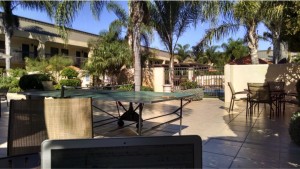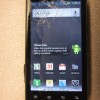How I Work on the Road
As a solopreneur who is also a bit of a homebody, I don’t have a typical off-site office from which I work. Most of the time, I work from my living room – at my standing desk, at our table, or on the couch. However, I also travel (fly) for work. I am a professional public speaker on the topic of personal finance for early-career PhDs, and delivering talks at universities almost always involves 2+ flights and a hotel stay.
I now perceive traveling to be a double-edged sword when it comes to getting work done. On the one hand, isolation from my home, my husband, and (sometimes) the internet can often help me complete tasks and projects quite efficiently. On the other hand, the inconveniences of travel can easily impede productivity, even with proper planning.
I had a dismal (from a productivity standpoint) experience with working on the road during our cross-country move last summer, but I’ve slowly improved my systems through my frequent air travel in the last few months and now I feel confident about my ability to work on the road.
Working on the Road Fail: Cross-Country Trip
Last summer, Kyle and I moved from Durham, NC to Seattle, WA via a cross-country road trip. I thought it would be a great test of how I could balance my location-independent business with living my life. Michelle from Making Sense of Cents has been living and working on the road full-time for several months now. While the vacation aspect of our trip was amazing, the work aspect was a gigantic disaster.
We were so busy packing up and cleaning our home in Durham that we didn’t plan the cross-country trip at all. We had a few sites/cities we wanted to swing through, but we didn’t make firm plans like booking lodging for specific nights. We ended up securing our lodging for each night the morning of, which led to one large and a few small misadventures. And you can bet that if I didn’t know where I was going to lay my head that night, I was not thinking ahead as to what work I might be able to do on the road.
My one somewhat successful day of working from the road was the first. I had a few calls with potential clients scheduled, which I was able to complete from the car while Kyle drove, and I also responded to a bunch of emails that had been building up while we were packing. On that first driving day, we went far enough west that my Sprint cell coverage became spotty, so I switched to using Kyle’s phone for my last client call. In what can only be described as a comedy of errors, Kyle’s (Verizon) phone lost its ability to recharge the night before our trip, so while I was able to finish my work call, his phone was dead by the end of the day and there was no resuscitating it. For the remainder of the (unplanned, unmapped!) trip, we had one completely dead phone and one phone that had only intermittent cell coverage east of the Mississippi River and essentially none in the vast American West until we got to Washington State. How we managed our road trip with that particular challenge is a story for another time, but it definitely had a detrimental effect on the time and resources I could have devoted to working.
After the first day, I essentially gave up on the idea of getting any work done on our driving days, and only endeavored to stay on top of my email when we had Wi-Fi coverage at our hotels.
My Current Working on the Road System
If I were to take that cross-country road trip again today, I’m confident that I would be able to get some work done alongside enjoying the vacation with Kyle because in the last few months I’ve developed a system for working from the road.
How I Plan
The key to my road productivity is lining up tasks and projects that can be accomplished with my available resources at each stage of the travel. The day before my trip, I match each stage of travel with the work that must/can be accomplished in it and make sure I have the right files available to complete the work on the appropriate device. Typical settings for my travel these days include public transit, airports, airplanes, private cars, hotels, and universities.
I ask and answer five key questions for each stage of my travel to help determine and prepare for what work will be appropriate for each stage.
Which devices will be appropriate to use?
Each travel setting determines or influences the device I want to use, usually based on the space available and the amount of time I’ll be in the setting. For example, on the bus I prefer to use only my smartphone or read a book because of the cramped space and the short time available. On flights, I like to prioritize laptop usage, but during takeoff and landing I’m confined to using only my iPad.
Will I have Wi-Fi, cell coverage, or neither?
I like the periods when I don’t have connectivity because there are fewer distractions and I can really focus on my work. This reason, alongside the cost, is why I don’t pay for internet in airports or on flights. But of course the type of work I can do changes with my internet connectivity. Emails, uploading or downloading files, and internet-based searches can only be done when I have Wi-Fi or cell service. When I don’t have Wi-Fi coverage, I like to work on content creation, such as writing or making slides.
Will I have access to a power outlet?
Probably my biggest challenge in working on the road these days is device power because it’s the most difficult to determine in advance (airline, airport, and airplane variations). The battery life of my 4.5-year-old laptop is dismal. I can count on about an hour of use when it’s not connected to power. (My smartphone also has the potential to die before the end of a long day of travel, but I solved that issue by purchasing an external power source.) On the other hand, I can work on my iPad all day long without running out of juice. In airports, I’m always searching out charging stations, and I celebrate when I have a power outlet at my seat on a plane. Everything type of work possible gets shunted away from my laptop and to iPad or my phone. For example, I do a lot of my article-writing in Evernote on my iPad when I travel (and I like to have the notes set up with writing prompts before the trip), but I need my laptop for incorporating student feedback into the presentation I’m about to give. I’m conscious about preserving my laptop battery for the tasks that only my laptop can do.
Will I want/need to interact with anyone?
If Kyle drops me off or picks me up at the airport, for example, I definitely want to connect with him during that time instead of being buried in work. I also usually leave space for taxi or Uber drivers to chat with me if it seems that they want to, since I can imagine that driving all day and having no human interaction can become mind-numbing. I’ve had some really interesting conversations with Uber drivers on a few trips after they find out what I do for a living, and I’m glad I didn’t miss out on their perspective because I was ignoring them in favor of my work. The rest of the travel time, though, I can pretty well assume that no one will need to interact with me.
What will my state of mind be?
When catching an early-morning flight, I’m often sleep-deprived, which means that I’ll probably try to catch a few winks on the plane. If I’m traveling immediately after delivering a talk, I tend to be either completely wiped or completely amped. For the former, I will try to sleep or do something that doesn’t require much brainpower. For the latter, I often journal about the speaking experience, dream big about future projects, and/or get a lot of inspired work done. I’m okay with building in some time off from working during these return trips, as it’s been a long day of work already, but I also want to have ideas for what I could work on if I turn out to be in an energetic and creative state of mind.
The Result
At the end of this process, I have a list of all the work that I might want to do on the trip organized by when, where, and on what device it should occur. I make sure to differentiate between work that must be finished by a certain stage of travel and work that would be nice to do. This may seem like overkill, but not planning my work out in this detailed manner led to a lot of wasted time and creative energy and nearly missing a couple deadlines. My most potentially productive time, the middle of flights (no distractions for an extended period, tray table for device), easily became my least productive time on some of my early trips when I had to cast around for something to work on, didn’t have the right files/prompts on the right device, or had allowed my devices to die.
A list of possible work to accomplish for one of my current trips would look something like this:
- laptop, no Wi-Fi
- update presentation according to student registration question responses
- update seminar handout
- create presentation on setting yourself up for financial success in graduate school
- contract work
- laptop, Wi-Fi
- send seminar handout to host
- download student registration question responses
- download contract work files
- upload contract work files
- create and send travel quote to potential client
- respond to emails
- iPad, no Wi-Fi
- silently rehearse talk
- write “Graduate Students, Don’t Believe these Tax Lies!” series for Grad Student Finances
- write pitches for upcoming GradHacker articles
- edit draft of upcoming Evolving Personal Finance blog post
- brainstorm future projects
- smartphone, cell coverage
- RSS reader
- respond to emails
The list would also include notes about things that have to be done by certain points of the trip, such as working on a document and then emailing/uploading it, synching Evernote across my devices, or downloading files that were sent to me en route so I can use them in the next leg of the trip.
Applying this framework to our road trip last summer, I definitely would not have tried to work all day on our driving (non-activity) days because I would want to engage with Kyle quite a bit and also take my turn driving. The challenges would have been 1) the lack of Wi-Fi and cell coverage on the road, which would have spurred me to prepare my work for the following day the previous night at our hotel, and 2) the battery life of my devices, given that we would only be able to recharge overnight. I’m sure I would have ended up working quite a bit on my iPad, which means writing, brainstorming, and journaling. I probably could have knocked out months of EPF and GSF posts had I been prepared to do so!
I’m quite happy with the amount and type of work I’m able to do when I’m traveling for speaking engagements these days. In fact, I think I do my best writing on planes! I even enjoy the forced efficiency of having a limited amount of time in which to accomplish something (e.g., the length of a flight). I’ve tried to replicate the aspects of the working conditions on flights that I enjoy in how I work from home – plus elbow room, of course!
What are your strategies for working on the road? What are the relative advantages and disadvantages to working on the road vs. in the office/at home?
Filed under: self-employment, travel · Tags: solopreneurship, travel, working on the road


 Missteps on the Road to Value: Cell Phone Saga
Missteps on the Road to Value: Cell Phone Saga I Don’t Work for the Money
I Don’t Work for the Money Am I a Work-at-Home Wife or a Stay-at-Home Wife?
Am I a Work-at-Home Wife or a Stay-at-Home Wife? Running a Location-Independent Business from the Same Room Every Day
Running a Location-Independent Business from the Same Room Every Day


I try not to work when we are traveling. I’m too distracted, and I don’t enjoy working when I’m spending good money on a vacation. With that being said, I do have to work on vacation occasionally because we normal take 8-10 vacations per year. That’s a lot of time off work if you never work on vacation!
The hardest part about working on vacation is keeping my kids busy. Normally, I can get the hubby to take the kids somewhere for a few hours so I can get my most important tasks done. It’s really hard to work when the kids are nearby.
I don’t love the idea of working on vacation either, but as you said you have a LOT of vacation time – many times that of the average American, I’m sure! It’s not so bad for me because my travel days now are all workdays anyway; it’s just a different setting. Great point about having to keep your children occupied. That’s why you pay for childcare at home!
Thankfully I haven’t had to work much on the road. But all your strategies sound great!
Tangential question, do you use version control, ie svn or git?
When you have longer trips, like we did in grad school, it’s not so crucial to get work done during transit, but I’ll waste 1.5-2 workdays each time I travel if I don’t!
Kyle’s answer to your question: Yes for the theme, no for the database content.
Impressive. There’s no way I could work on the road. At all. It’s hard enough for me to work from home with my ADD husband constantly either wanting to talk to me or watching TV that’s distracting.
On the few occasions that I do travel, I’m always sleep deprived, so I tend to just want to nap or read.
When we go for long drives, Kyle doesn’t need me to entertain him, but at the same time I felt bad about ignoring him in favor of my work. I definitely wouldn’t be able to work if he requested/demanded my attention!
On my last trip (since I published this post), I was super sleep deprived so I just slept or read for fun the entire time I was traveling – a big departure from what I usually do but I needed it!
I always do some tasks on the road. I read my report on the bus to work or do some edits in it and at first it’s really hard to stay focused because it’s wobbly, but I have gotten used to it, Emily.
The stability of the transit definitely makes a difference! Thankfully the ones I use are pretty stable, but I would have trouble concentrating if it weren’t.
I can’t imagine working during a cross-country road trip. I don’t think I would be able to focus at even, even if we didn’t have twin toddlers that require a lot of attention.
Sometimes a vacation should just be a vacation!